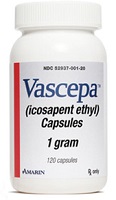 In case you're in doubt about why pharma is suddenly all about the First Amendment, here's some illuminating evidence. In a letter obtained by CardioBrief's Larry Husten, Amarin ($AMRN) makes very clear that it sued the FDA last week for marketing reasons, not out of love for the Bill of Rights.
In case you're in doubt about why pharma is suddenly all about the First Amendment, here's some illuminating evidence. In a letter obtained by CardioBrief's Larry Husten, Amarin ($AMRN) makes very clear that it sued the FDA last week for marketing reasons, not out of love for the Bill of Rights.
Like other drugmakers before it, Amarin is suing for the right to talk up a product's off-label uses, citing its right to free speech. In this case, the drug is Vascepa, a cardiovascular remedy derived from fish oil. It's approved for just one limited indication--in patients with extremely high triglycerides--and so far, Amarin has failed to persuade the FDA to broaden that use to patients with high triglycerides at high risk of coronary artery disease. And that's a much larger, and potentially much more lucrative, opportunity.
No wonder, then, that Amarin wants to tell doctors about Vascepa's utility in that group of people. And the drug did, in fact, lower the blood lipids it targets. But trial data didn't prove it was actually effective at staving off coronary artery disease.
As Husten writes in Forbes, just as it sued the FDA over its First Amendment rights, Amarin dispatched a confidential letter to doctors who speak on behalf of the company. And that letter makes clear that its paid speakers aren't free to say what they please, constitution or no.
Some of the cautionary language in the letter is about avoiding talk that violates current rules on off-label promotions. If asked about the lawsuit from a medical angle, these doctor-speakers can talk about the ANCHOR trial results, which showed that Vascepa lowered triglycerides in trial participants, but can't say much more, at least not at a public event. (One-on-one conversations are more open under FDA rules.) If asked about the lawsuit, no comment.
And if Amarin wins its free-speech argument in court, then it will "move rapidly to deliver to you additional Company-approved training and updated promotional speaker materials," states Amarin's letter, signed by its SVP for marketing and sales, Aaron Berg, and its president of R&D, Steven B. Ketchum.
It's no secret that drugmakers like to control what their paid speakers say during events. A multitude of whistleblower lawsuits cite company-approved slide decks, scripted presentations and recommended answers to common questions. That's one reason why drugmakers have come up for criticism for their high-dollar spending on physician speakers: Pharma companies may call the presentations "educational" but they're clearly promotional as well.
If drugmakers like Amarin get their way on off-label speech, then that "education" can include info on uses that haven't passed muster at the FDA.
So, if Amarin's legal case succeeds, then Big Pharma may well have reason to thank the small company. As its speakers bureau letter says, "This is a precedent-setting lawsuit that seeks to break new ground on the rights of free speech."
Meanwhile, the FDA has recently shown a new willingness to consider the free speech argument, thanks to an appeals court ruling that appears to favor pharma's case. And the agency will take up the issue in a public forum this summer. No doubt drugmakers will line up experts to weigh in. Amarin included.
- read Husten's column at Forbes